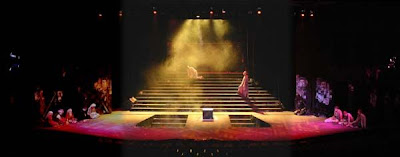
|
13 * 14 ... 16
Preparing show for Audience ( different from rehearsing for Spectator ) -- chronotope ( subjective time and dramatic space ), how to transform it? "Spectator" -- new role (character) in R/G and I need it -- ... (Big) Puppet -- why? 5 spots/points. Who is Player? ...
|
|
Audience wikipedia : An audience is a group of people who participate in and experience or encounter a work of art, literature, theatre, music or academics in any medium.
audience : Audience pay their $10.00 to see the inner of characters.
thinking as a director
"Between spectator and public" (one and all): I > Hero > I as Hero > Our Hero Subjective (dramatic) [MY] Time > OUR Time [ social, new "objective" time -- Historical Time ] Montage = F (Spectator) Partnership of spectators = mirroring the stage. "Method Acting for Spectators" [ The Book of Spectator ]. collective unconscious -- Theory of Carl Jung which states that all humans in all cultures share a universal consciousness. He theorized that symbols arose spontaneously in radically different cultures because people "saw" the image in a dream or vision. He spent much of his life collecting the icons and symbols of various civilizations in an attempt to validate this theory. He referred to these common symbols as archetypes. individuation -- Psychological independence... (through collective experience, catharsis?) Joseph Campbell -- Symbology -- The art of expressing by symbols. ...
|
The dynamics ... "Private in Public" existence expirience for demos. And -- "After the Show" effect (Public).
audience... (5) The act of hearing or attending.
[Middle English, from Old French, from Latin audientia, from audiÁns, audient-, present participle of audÓre, to hear.]http://www.answers.com/topic/audience
...
Next: lesson 16. Public ( Public in The Book of Spectator )
"I know no more about this play than anyone who just reads it attentively," Beckett wrote. "I don't know what spirit I wrote it in. I know no more about the characters than what they say, what they do and what happens to them . . . everything I have been able to learn, I have shown. It's not a great deal. But it's enough for me, quite enough. I'd go so far as to say that I would have been content with less . . . Estragon, Vladimir, Pozzo, Lucky, I have only been able to know them a little, from far off, out of a need to understand them. They owe you some explanations, perhaps. Let them unravel. Without me. Them and Me, we're quits."(*)
You are the author! (see Bakhtin)
(*) ∑ Peter Hall's 50th anniversary production of Waiting for Godot is in preview at the Theatre Royal, Bath, from August 16. [Monday July 25, 2005 The Guardian]
http://www.samuel-beckett.net/Godot_Endgame_Worton.html Waiting for Godot and Endgame: Theatre as Text:
Beckett once asserted: 'I produce an object. What people make of it is not my concern [...] I'd be quite incapable of writing a critical introduction to my own works.' Furthermore, whenever directors and critics asked for explanations of Godot, he both side-stepped their questions and revealed his distrust of any kind of exegesis. Two examples will suffice here. To Alan Schneider's question 'Who or what does Godot mean?', he replied, 'If I knew, I would have said so in the play'; when Colin Duckworth suggested that the characters existed in a modern version of Dante's Purgatory, he responded to the 'proofs' offered to him with a dismissive, if generous 'Quite alien to me, but you're welcome.' As is now clearly established, allusions to Dante are present throughout his novels and plays, but Beckett's position remained resolute; he wanted no part in the decoding process that haunts critical work, preferring to cling to his belief that: 'The key word in my plays is "perhaps"'...
 |
| From Oedipus |